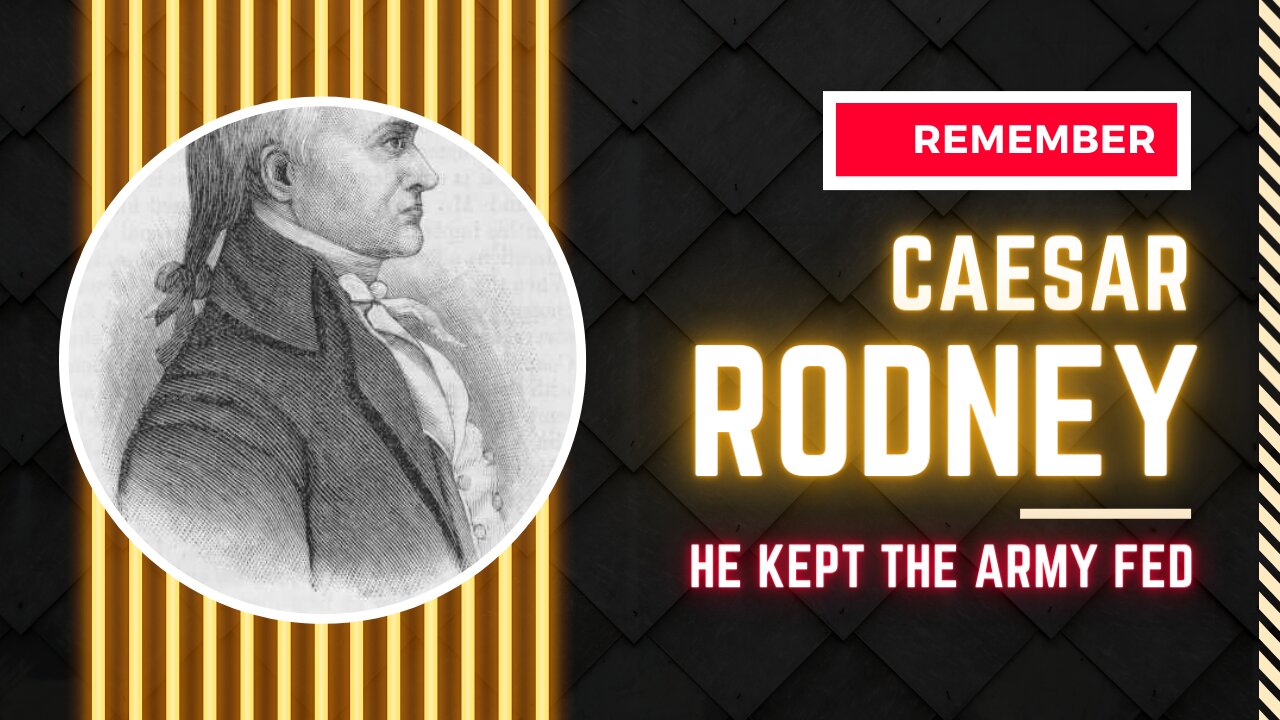Premium Only Content

Caesar Rodney – an unusual hero
Caesar Rodney – an unusual hero
By Terry A. Hurlbut
239 years ago yesterday, Caesar Rodney died, in the ninth year of the independence of America from the United Kingdom. History records, of course, that he signed the Declaration of Independence. But he did much more than that. A consistent advocate for independence, he not only voted for it but fought for it – on the home front, as it were, but still fighting. Sadly, his health would fail him, and cancer would bring him to an early grave at the age of 55.
Caesar Rodney – early life
Actor James Woods, known for his role as an Army psych warfare officer in 1999’s The General’s Daughter, left this long-form tweet giving a short history of the life of Caesar Rodney.
https://twitter.com/RealJamesWoods/status/1673225490675671040
He was born near Dover, Delaware, into a family of planters. Like all plantations, the Rodney plantation held slaves, as the History Channel reminds us. That would become important, not during his life, but in modern times.
His father died when he was sixteen years old, and the Orphan’s Court placed him in the care of Nicholas Ridgely, a clerk of the peace in Kent County, Delaware. His foster father’s influence might or might not have inspired him to seek a career in politics.
He began a career in public service at the age of 22, filling many roles that aren’t always partisan. James Woods lists most of them, but at least two stand out during this period:
• Sheriff of Kent County, and
• Clerk of the Orphan’s Court, an ironic position considering his history.
Beginning at age 30, he held the positions that would prepare him for service in the Continental Congresses and the War for Independence. They included:
• Member of the Delaware Assembly (1762-76; Speaker 1775-76),
• Delegate to the Stamp Act Congress (1765),
• Associate Justice, Delaware Supreme Court (1769-77), and
• Captain of militia for Kent County during the French-Indian War.
The Midnight Ride
In 1774 he became a delegate to the First, then the Second, Continental Congress. His service was rather quiet, mainly because the cancer that would kill him was already disfiguring him. For that reason – and also because at the time Delaware had raised a militia which the Assembly had appointed him to command – he was away from Philadelphia for most of the debate. His two fellow delegates split their votes, Thomas McKean in favor and George Read against. And so, on the final day of debate, the decision came down to Rodney himself. The reason: the proponents of independence very much desired a unanimous vote of all the colonies. The Delaware delegation, with one delegate absent and the other two split, was hopelessly deadlocked. (Ironically, Rodney was in personal command of an operation to quell a Tory riot.)
So Mr. McKean wrote urgently to Caesar Rodney, begging him to return to Philadelphia and break the deadlock. This Rodney did.
He then famously rode 80 miles toward Philadelphia, through a thunderstorm, entered into the convention and broke that deadlock, casting his vote in favor of Delaware declaring its independence from Great Britain with the other colonies.
Jonathan S. Russ, University of Delaware
Exhausted and ill, he arrived during the canvass of the delegates. And so Delaware, by a 2-1 vote, said yes to independence. Two days later – on July 4 – Caesar Rodney added his signature to the formal document.
He kept the Army fed
Almost at once, Caesar Rodney was in service, though his service was almost entirely on the home front. He held the dual posts of President of the independent State of Delaware and Brigadier General of its militia. In that latter role especially, he provided critical logistical support to George Washington’s Continental Army. Not only did he move supplies to where Washington needed them, but he often had to pay for them himself.
To put that into perspective, the first United States currency, the Continental, had very slim backing. “Not worth a Continental” became a common saying. Small wonder, then, that Congress failed to pay for, or even provide, vital supplies. But Caesar Rodney made sure that General Washington would have the supplies his Continental Army needed. The two men corresponded regularly, so Rodney would know what Washington’s army needed, and how quickly.
The French Emperor Napoleon famously observed that an army marches on its stomach. In that sense, Rodney’s role during the War was critical – and General Washington appreciated it. People don’t remember Caesar Rodney for fighting any Great Battles during the war. That was not his skill – and in fact he never saw combat during the French-Indian War. But he saw the need for organization and especially for a supply chain. Without his quiet but vital service, the victories Washington did achieve, would not have been possible.
Modern controversy surrounding Caesar Rodney
In 1922, James Edward Kelly created a statue of Caesar Rodney riding on his horse – probably on his Midnight Ride. (Remember: his contribution was in logistics, not in operations.) So the 1999 Delaware State quarter reverse does not feature Paul Revere. Rather, it features Caesar Rodney, making a ride that might not have had a poet to celebrate it, but was no less important for all that.
Sadly, in the Long Hot Summer of 2020, riotous crowds threatened to destroy the statue, which stood in Rodney Square in Wilmington. So the city fathers removed it – along with the statue of Christopher Columbus. Both statues are sitting in storage now; nobody knows where. And not everyone in whose name those rioters protested the statue, were happy with the removal! Theodore J. Davis, Jr., Professor of Political Science at the University of Delaware, saw nothing positive in removing the statue. He would much rather have seen another statue go up next to the Rodney statue, something commemorating the slaves and what slavery was all about.
But immortality depends on memory. So as long as enough people remember Caesar Rodney, and what he did both on Independence Day and afterward, he will always live on, in the hearts of patriotic Americans.
Link to:
The article:
https://cnav.news/2023/06/27/editorial/talk/caesar-rodney-unusual-hero/
James Woods’ tweet:
https://twitter.com/RealJamesWoods/status/1673225490675671040
Declarations of Truth Twitter feed:
https://twitter.com/DecTruth
Conservative News and Views:
https://cnav.news/
The CNAV Store:
https://cnav.store/
Our Silver Lines
https://oursilverlines.com/
-
 16:35
16:35
Declarations of Truth
12 days agoFBI headquarters getting cleaned out?
1691 -
 1:03:30
1:03:30
Sarah Westall
4 hours agoMassive Government Overhaul: FBI, CIA, IRS and more to be Gutted w/ Sam Anthony
9.98K2 -
 LIVE
LIVE
IsaacButterfield
4 hours agoAustralia Under Attack | Trump's State of the Union | All LGBTQ Cast (W Guest Frenchy)
168 watching -
 LIVE
LIVE
Edge of Wonder
4 hours agoIs Your Car Collecting Your Biodata? Whistleblower Exposes Dark Agenda
510 watching -
 LIVE
LIVE
Quite Frankly
6 hours ago"News Round-Up, Celebrity Stories, Friday Extras" ft. J Gulinello 3/7/25
1,383 watching -
 55:49
55:49
LFA TV
1 day agoGermany Started Two World Wars and Now Wants Nuclear Weapons | TRUMPET DAILY 3.7.25 7PM
9.8K8 -
 LIVE
LIVE
2 MIKES LIVE
2 hours ago2 MIKES LIVE #189 Open Mike Friday (Sort Of)
286 watching -
 1:48:14
1:48:14
Right Side Broadcasting Network
11 hours agoLIVE REPLAY: President Trump Delivers Remarks at The White House Digital Assets Summit - 3/7/25
128K41 -
 2:07:17
2:07:17
The Quartering
8 hours agoTrump Goes Ballistic On Russia & Ukraine Gets Results, Democrat Cringe, FBI Arrests Military Men
127K74 -
 1:33:20
1:33:20
Sean Unpaved
7 hours agoWhat Could The 2025 NFL Draft & Season Look Like with Special Guest 2x Super Bowl Champ Phil Simms
40.8K6